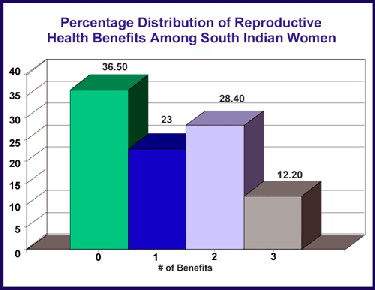
Return to the Monitor front Page
For more information on CECHE and its programs visit CECHE's Homepage

CECHE Chairman Sushma Palmer Comments on This Quarter's Topics

Action, not Reports, Needed to Reverse Diet, Nutrition Woes

 The
"5 A Day" Campaign: Are Americans Listening?
The
"5 A Day" Campaign: Are Americans Listening? Sedentarism
Runs Rampant Worldwide
Sedentarism
Runs Rampant Worldwide
 South
Indian Reproductive Health Tied to Cultural Roots
South
Indian Reproductive Health Tied to Cultural Roots Democracy
and Health Go Hand in Hand
Democracy
and Health Go Hand in Hand
 Guidelines
Dictate Lifestyle Changes for Americans
Guidelines
Dictate Lifestyle Changes for Americans WHO
Is Central to Fighting NCDs
WHO
Is Central to Fighting NCDsDownload a complete Monitor (PDF)

Regression analysis revealed that perceived benefits were the strongest predictor of good reproductive health behavior, defined as using contraception, having access to health care and citing doctors as a source of contraception.
A detailed analysis of the perceived benefits related by study participants revealed that nearly two-thirds (63.6%) of the women reported at least one, and as many as three, benefits for using contraception. (See chart.) Among the reported benefits were: a better lifestyle for children; affordability; freedom from fear of an unwanted pregnancy; recommendation by physicians for improving health; time to regain lost strength between pregnancies; spacing between children; and permanent contraception as an alternative to abortion. Two in five of the women (40.6%) enjoyed two or three benefits.
The most commonly cited reasons for using contraception were affordability and a better lifestyle for children. To the women, affordability seemed to imply economic constraints that could not support repeated pregnancies or many children. This point was illustrated by the following participant response: "My husband lost his job, and he asked me to undergo sterilization. We could not afford another child or even another abortion."
A better lifestyle for children meant that the women could lavish more resources and attention on their existing children. As one woman reported, "I underwent sterilization after two children. I wanted to give them the best life possible, and the only way I could afford to was if I stopped having more children." Another participant emphasized, "I have only one desire -- that my children should have a life that is not like mine. For that, I will do anything -- sacrifice my health, needs, happiness…and maybe even my life."
These responses, among many others, demonstrate that the surveyed women are not motivated by self when it comes to reproductive health behavior, but by the needs of their relatives and children -- by the larger unit, the family. Such culturally rooted reproductive health behavior among women has vast implications for future health education.
[Next News Article]
© 2003 CECHE